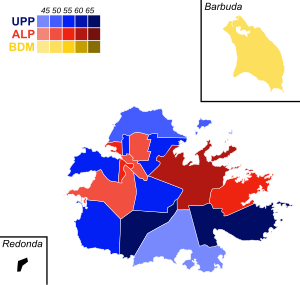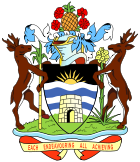
Antigua and Barbuda is a sovereign island country in the Caribbean. It lies at the conjuncture of the Caribbean Sea and the Atlantic Ocean in the Leeward Islands part of the Lesser Antilles.

The politics of Antigua and Barbuda takes place in a framework of a unitary parliamentary representative democratic monarchy, wherein the sovereign of Antigua and Barbuda is the head of state, appointing a governor-general to act as vice-regal representative in the nation. A prime minister is appointed by the governor-general as the head of government, and of a multi-party system; the prime minister advises the governor-general on the appointment of a Council of Ministers. Executive power is exercised by the government. Legislative power is vested in both the government and the two chambers of the Parliament. The bicameral Parliament consists of the Senate and the House of Representatives.
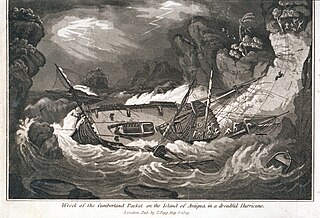
The history of Antigua and Barbuda covers the period from the arrival of the Archaic peoples thousands of years ago to the present day. Prior to European colonization, the lands encompassing present-day Antigua and Barbuda were inhabited by three successive Amerindian societies. The island was claimed by England, who settled the islands in 1632. Under English/British control, the islands witnessed an influx of both Britons and African slaves migrate to the island. In 1981, the islands were granted independence as the modern state of Antigua and Barbuda.
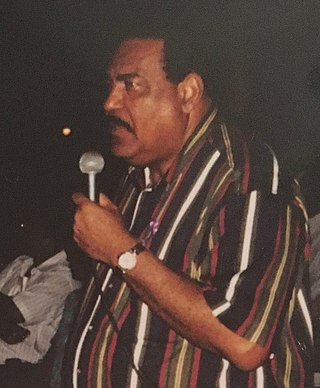
Sir Lester Bryant Bird was an Antiguan politician and athlete who served as the second prime minister of Antigua and Barbuda from 1994 to 2004. He was chairman of the Antigua Labour Party (ALP) from 1971 to 1983, then became prime minister when his father, Sir Vere Bird, the previous prime minister, resigned.

The Antigua and Barbuda Labour Party (ABLP) is a political party in Antigua and Barbuda. The current leader of the party is Gaston Browne, who serves as the Prime Minister of Antigua and Barbuda. The party had previously been led by Lester Bird, who was chairman of the party since 1971, and was Prime Minister and political leader in 1994.
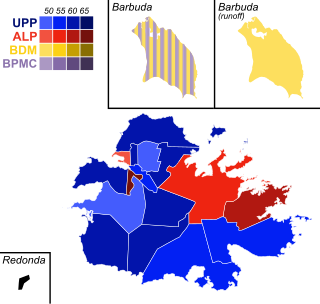
General elections were held in Antigua and Barbuda on 23 March 2004. The result was a victory for the opposition United Progressive Party (UPP), which defeated the incumbent Antigua Labour Party. Baldwin Spencer, leader of the UPP, replaced Lester Bird as Prime Minister of Antigua and Barbuda, with Bird being one of eight Labour MPs to lose his seat. Spencer became only the second Prime Minister from outside the Bird family or the Labour Party.
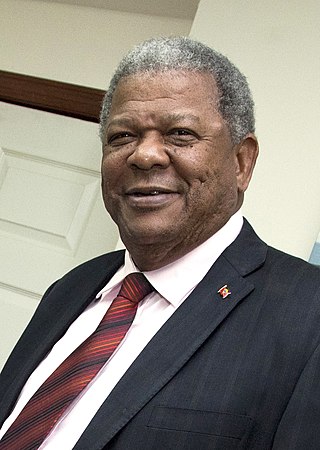
Winston Baldwin Spencer is an Antiguan politician who was the third prime minister of Antigua and Barbuda from 2004 to 2014.

Elections in Antigua and Barbuda take place in the framework of a parliamentary democracy.
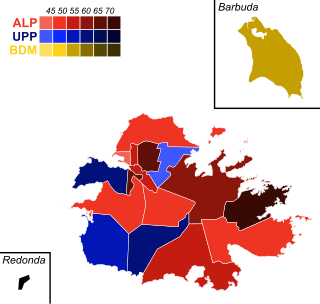
General elections were held in Antigua and Barbuda on 9 March 1999. The elections were won by the governing Antigua Labour Party. Lester Bird was re-elected Prime Minister of Antigua and Barbuda. Voter turnout was 63.6%.

The House of Representatives of Antigua and Barbuda is the lower chamber of the country's bicameral parliament. Each of the constituencies created in accordance with section 62 of the Constitution shall elect one representative to the House in a direct election in accordance with the procedures specified by or pursuant to any law, subject to the rules of the Constitution. Unless he is prohibited by law from registration as a voter for the purpose of electing a member of the House, every Commonwealth citizen who is eighteen years of age or older and who meets the requirements relating to residence or domicile in Antigua and Barbuda as prescribed by Parliament is entitled to be registered as such a voter in accordance with the provisions of any law in that regard, and no other person may be registered. Every person who is registered to vote in any constituency shall, unless prohibited from doing so by any law, be entitled to vote in accordance with the provisions of any law in that regard in any election of members of the House in that constituency. Voting is free and must be done by secret ballot in accordance with any rules that Parliament may impose during House member elections.

General elections were held in Antigua and Barbuda on 29 November 1965, and continued on 15 December after three candidates withdrew before the original date. They were won by the governing Antigua Labour Party (ALP), whose leader Vere Bird was re-elected as Chief Minister.
Sir Robin Yearwood KGCN is an Antiguan politician and member of the Antigua Labour Party (ALP). Entering Parliament in 1976, Yearwood served as Minister of Agriculture, Land and Fisheries in the ALP administration until a cabinet reshuffle in 1987 saw him take over Vere Bird, Jr.'s portfolio for Aviation, Public Information and Public Utilities. Despite a failed attempt to oust the Prime Minister he retained this position, and kept it when he became Deputy Prime Minister on 9 September 2002 and Minister of Finance a year later. Following the ALP's loss in the 2004 election, Yearwood was one of only three ALP members left in the lower house, and became Leader of the Opposition. He held this position until 2006, when he was replaced with Steadroy Benjamin.
Sir Molwyn Joseph, KGCN, is an Antiguan politician and Chairman of the Antigua Labour Party (ALP). First entering politics in 1984 when he was made a Minister without Portfolio in the government of Vere Bird, Joseph became Minister of Finance seven years later, renegotiating the Antiguan national debt and introducing fiscal reforms. After a 1996 scandal in which it was discovered he had used his position to import a 1930s Rolls-Royce for a friend, bypassing normal import duties and taxes, he was dismissed from the Bird administration, returning 14 months later to serve as Minister for Planning, Implementation and the Environment. Following the 1999 general election, he became Minister of Heath and Social Improvement before being made Minister of Tourism and the Environment a few months later. As Minister, Joseph attempted to improve the perception of Antigua as a tourist destination and invest in the industry, spending 2 million US dollars increasing the number of hotel rooms on the island and providing money for both Air Jamaica and Air Luxor to provide flights to the island.
Errol Cort, is a Antigua and Barbuda politician, lawyer and economist. He was Minister of Justice and Legal Affairs and Attorney General of Antigua and Barbuda from 1999 to 2001 and has been involved with successful electoral reforms in the country. He served as Minister of Finance between 2004 and 2009 and is a member of the United Progressive Party (UPP), representing St. John's Rural East. Other ministerial positions held include Industry, Commerce, Customs, Investment, Economic Planning and Development, and Financial Services Regulation, Property Valuation and Tax Compliance.

General elections were held in Antigua and Barbuda on 12 June 2014. The result was a victory for the opposition Antigua and Barbuda Labour Party led by Gaston Browne, which won 14 of the 17 seats. Following the election, Browne became the country's youngest Prime Minister.
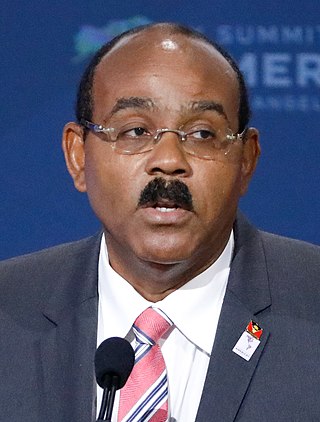
Gaston Alfonso Browne is an Antiguan politician serving as the prime minister of Antigua and Barbuda and leader of the Labour Party since 2014. Before entering politics, he was a banker and businessman.

General elections were held in Antigua and Barbuda on 21 March 2018 to elect members to House of Representatives of the 15th Antigua and Barbuda Parliament. Each of the 17 constituencies elected one Member of Parliament (MP).

General elections were held in Saint Lucia on 26 July 2021, having been constitutionally required by 12 October 2021. Voters elected all 17 members of the House of Assembly. The result was a victory for the opposition Saint Lucia Labour Party, which won 13 of the 17 seats in the House, while the ruling United Workers Party lost nine of its eleven seats, its worst result since 1997. It was the fourth consecutive election in which the incumbent government was defeated.

General elections were held in Antigua and Barbuda on 18 January 2023 to elect members of the House of Representatives. The Labour Party (ABLP) has held an absolute majority of 15 seats in the House of Representatives after the 2018 general election, with Gaston Browne remaining as prime minister. Browne initiated a constitutional referendum after the 2018 election, which was rejected by voters, and following the death of Elizabeth II in 2022, he announced his intention to organise a referendum for the transition of Antigua and Barbuda to a republican system. Besides ABLP, the United Progressive Party (UPP), Democratic National Alliance, Barbuda People's Movement (BPM), and three independent politicians filed candidacies for the 2023 general election.

The 13th legislature of Antigua and Barbuda was elected on 12 March 2009.
